-853X543.jpg)
Vijay Akela: Bol Rahe!
by Aparajita Krishna March 31 2022, 12:00 am Estimated Reading Time: 20 mins, 41 secsAparajita Krishna discusses voice and lyrics with poet-lyricist Vijay Akela - a unique conversation about poetry, vocabulary and the art form of conveying emotion through song, radio programs and podcasts.
Radio Jockey (RJ), lyricist, poet, writer, journalist, Vijay Akela may go by the pen-name Akela, but he is a people friendly person. He is immediately connected with the two hit film songs, Kaho Na Pyaar Hai’s ‘Ek pal ka jeena…..’ and Krissh’s ‘Dil na liya dil na diya….’
Apart from being RJ on FM Gold, FM Rainbow, he was also RJ on 89.1 Radio 4 FM, which is a popular radio station in Ajman, UAE. He informs, “In UAE, a RJ gets such respect! I was getting great salary and enjoyed clout! But living in Dubai did not appeal to me. I wanted to get back to my country. Away from India I truly realized the worth of India. I came back leaving everything behind. In India Suraiyaji had once called me asking, ‘Aap hi Vijay Akela hain? Achcha radio show karte hain.’ Pran Saheb had complimented me. Dev Anand Saheb had complimented me. In Dubai one would have fans gifting me big, big gifts. But they were not Javed Akhtar. They were not Aamir Khan. They were not Suraiya or Pran, or Asha Bhosle. So I left that world and came back to India. I did not even inform my employers.”
True to his calling his answers came as voicemails on WhatsApp. Vijay Akela ki zubaan aur boli chasni ki tarah meethi hai. He is very sweet-tongued and cultured in his talk. A gentility sits on his bearing and on his speech. If only I could share his voice-mails with you, you would understand.
Urdu is his passion. He speaks Hindustani with fine articulation and enunciation. He is rasik of Hindi films. His devotion and love for literature, films is child-like and endearing. His pronunciation of even my complicated name is perfect and poetic. Even his collection of photographs are very lovingly preserved and compiled. Bahut pyaar se sanjoya rakha hai. In answer to my compliment he voice-mailed this sher: ‘Jo khoya uss-e kya samajhna hai mujko?/Jo paaya main usmein hi uljha hua hoon’. And also this opposite one to that: ‘Jo paaya uss-e kya samajhna hai mujhko?/Jo khoya main uss-mein hi uljha hua hoon’.
Here is our exchange filled with wonderful anecdotes, film-tales and literary insights.
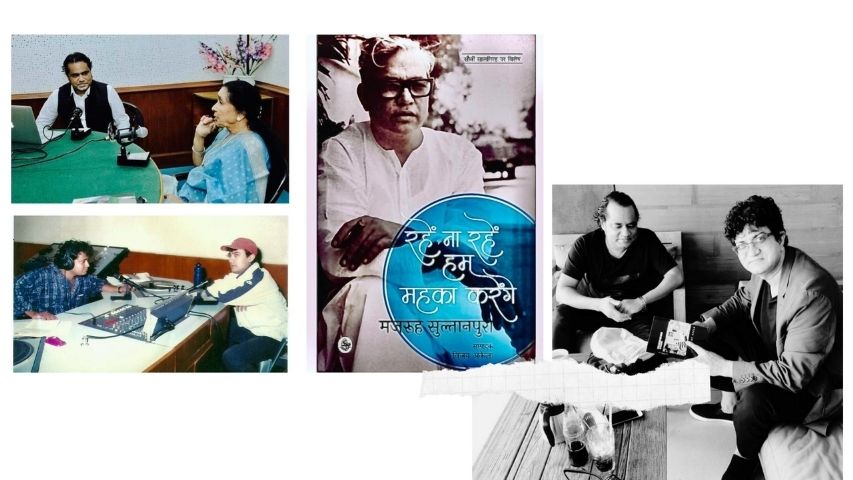
To begin in the present. The great presence of Lata Mangeshkar is no longer amidst us, but her legacy of songs will remain in our care as a heritance. On the Indian Performing Rights Society (IPRS) YouTube page you conducted a talk-session on 4th March 2022 in remembrance of Lata Mangeshkar - Ajeeb Dastan Hai Yeh. The participants were Amit Khanna, Lalit Pandit, Milind, Pavan Jha. Tell us about your journey and emotions attached to her songs. Any meeting with her that remains embedded in you?
I first met Lataji as a RJ. At that time in Mumbai there was only one radio station and the whole of Mumbai would remain tuned to that. That was a very special interview. I asked Lataji, ‘Are you a very emotional lady?’ She replied, ‘Ji haan, I am a very emotional girl’. About 70-80 of us staff members were present. Her reply stunned us. Here was a 72-75 year old lady calling herself a ‘very emotional girl’! Time stood still.
Who does not mourn her passing away? I recite to myself a nazm and placate the loss. (An excerpt) ‘Lata thi toh Mumbai mein chand nikalta tha/ Lata thi toh Mumbai ki kaisi qeemat thi/Lata thi toh Mumbai ki kaisi qismat thi/Lata ke chalte sur ka pata bhi chalta tha/Lata thi toh Mumbai mein chand nikalta tha….’
The wound was so deep. In another nazm of mine I say, ‘Kis se poochon bata ab Lata ka pata?/Iss prabhukunj se uss prabhukunj mein tum bhi mil hi gaye shakti ke punj mein/Kis-se poochoon ab main Lata ka pata…’
Yes, that interview in remembrance of Lataji that you mention, that was really good. All the panelists had all the time in the world for her. We are waiting and planning the second episode on Lataji.
Vijayji how and why did you think of ‘Akela’ as a pen name? Are poets meant to be alone even in a crowd? I find you always in the company of noted personalities.
When I was not even 15 years old I had kept Akela as my name. The inclination towards poetry came because of films. It was passion that pulled me along to Bombay. It told me to leave home, leave behind my family and embrace a new destination. My wonder and passion for our films, film songs, singing - the professionalism in the industry made me leave home in Bihar. In any case apart from writing what else could I have done? ‘Akela’ (Being Alone) has a lot of inherent strength in it. Rabindranath Tagoreji too comes to mind and his clarion call 'Ekla chalo’. I have noted that only as an Akela I have emerged a winner: be it in an argument, at a police station matter or in a political talk. If I involve people then I end up being confused.
Listen to a sher that defines Akela. ‘Raat diwali rahi, sansar mela hi raha/Bheedh mein bhi main akela tha, akela hi raha.’ The important thing is that you need a pen-name to be heard as a poet. The first revolution is with your name. All our great poets have done that. I too had to name-revolt.
Way back when I stepped into the film industry as a journalist it was the magic of Urdu that made me feel as if I have come into my own family. My wife’s name is Shahnaaz. She speaks very good English, Marathi, Gujarati and Urdu. Back in time during my initial days in Mumbai I was trying for acting. Then I did journalism. It was pretty late that I realized, ‘Oh God! I am a poet!’ Thereafter as a lyricist, as a poet I received a lot of respect, however modest may be the count of my work.
To go back in time. You are a native of Bihar. Tell us about your family and childhood.
I was born in Nalanda district of Bihar. My village is Lodipur. Now with Modiji around, the name Lodipur is in dispute. (laughs). My paternal grandfather was a farmer.
My forefathers were wrestlers/pehalwan and kisan. In those times farmers exercised a lot of clout. A farmer would supervise farming and also indulge in wrestling as a sport, as also indulge in poetry. In my large family only my Dadaji had some inclination towards singing. In 1975 there was a newspaper called Searchlight. It’s office was burnt down in Patna. My Dadaji wrote a poem on that incident. Now my family members are all engineers and doctors. We are originally farmers. My father was the first to become an engineer.
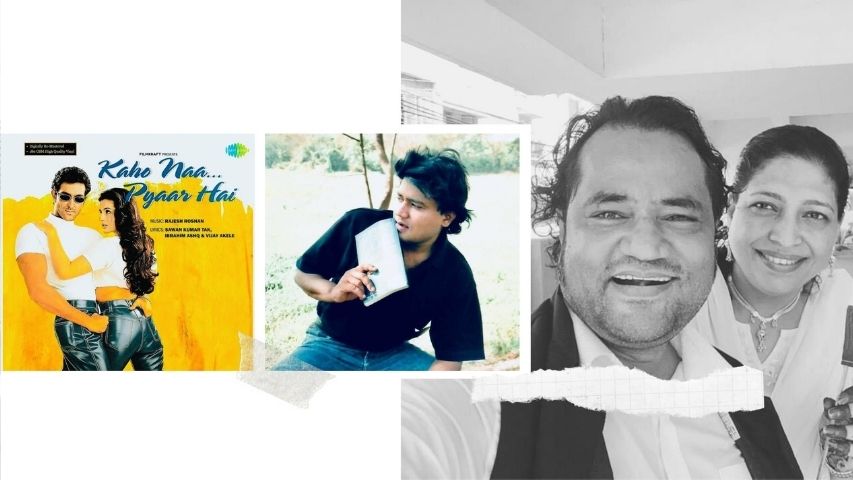
As for your schooling and college?
I did my school matriculation from Patna. Then did my graduation from Bihar National College, BN College, in English Honours. In Mumbai University I took my admission in MA in English, but did not complete it.
Was poetry, literature, especially Urdu literature always a fascination with you?
Fascination for Urdu shayari came via Hindi films. Urdu, the language of our films is such a beautiful tongue. The structure of Urdu poetry is so good. Just look at the works of Ghalib!
If I recall right my first memory of you is as a film assistant to Prakash Jha, back in the late 1980s or early 1990s on the serial Vidroh for DD. I was acting in it. Thereafter to today the Patna Boy has come a long way.
Vidroh was supposed to be a film. I was location in-charge. I was working with Prabhat Jha Saheb. Prakash Jha taught him screenplay. We had gone for location survey. Then I contracted kalazaar. Thereafter I got my admission into Mumbai university. I took leave from Vidroh mid-way. We had first met there, yes. Shooting was in Champaran. You were the heroine. Later I came to know that Vidroh was converted into a serial. I am proud that I was for sometime associated with Prakash Jha on this serial as an assistant of sorts.
Back in Patna I had done theatre as an actor. Street plays especially. I am very obliged to Prakash Jha (producer, director) for helping me and facilitating my visit to the FTII.
Then you became a Bombay Boy, a film journalist and gradually a RJ and lyricist.
My taking up admission in English literature in Mumbai University made it easy for my father to tell people that his son has gone to Mumbai to study. I was actually not studying. But I got the advantage of a hostel stay. I am talking of 1991. Only for a year Baoji sent me money. I started with journalism. In the English edition of Filmfare in 1991, an article of mine was published - Big is Back. At that time a dispute was running between cinema halls and video parlors. The audience had started coming back to the cinema halls.
Then I did freelance work. For Gee Magazine I wrote regularly. I had conducted an interview with Phoolan Devi. With my tape-recorder I went to Delhi to record the verdict; even though in the courtroom a recorder was not allowed. It was my passion that drove me. Nadeem Saheb (Music Dir) would during his legal case days give me interviews. This was around 1996-1997. Film journalism became my bread and butter. Then a lot of fights, disputes emerged because I was forthright. I was not scared. I also started my work as a radio jockey. That was sweet journalism. Print media was difficult. I would take live interviews for radio. Songs would play alongside. I continued writing lyrics.
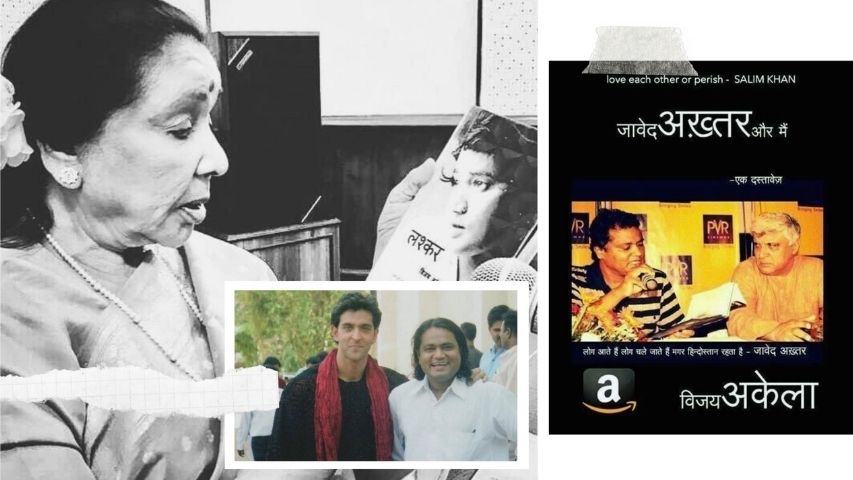
In those early years in Mumbai who were the noted film people you got in touch with?
Deep friendships got formed with Laxmikant-Pyarelal and Asha Bhosle ji . Among actors, my friend has been Aamir Khan. Javed Akhtar Saheb, ‘Oh God!’ Javed Saab, Shabanaji have been very close to me. Among the singers I forged friendships with Kumar Sanu, Udit Narayan. With Udit Narayan it is like family. Then Nadeem-Shravan. From London Nadeem would give interviews to me. I had once taken an interview of Rajesh Roshan on Kishore Kumar.
The song Ek Pal Ka Jeena from Kaho Na Pyaar Hai (2000) with music by Rajesh Roshan, sung by Lucky Ali, picturized on Hrithik Roshan was your debut as a lyricist. What a debut! It was a super hit. You were also nominated for Filmfare. Tell us about its making.
One day I called up Rajesh Roshan saying, ‘Sir I am passing by your place and if you are free I would like to give you the article.’ He asked me to come over. He was sitting with a lyrics writer working on a composition. When the lyricist left I remarked, ‘Is it so easy to write a song?’ Rajeshji commented, ‘Can you write on the meter?’
He gave me the tune of ‘Ek pal ka jeen… ‘. In a minute or so I composed it. He told me, ‘Take your time. 20-25 days. Sahir Ludhianvi Saab would take months.’ I took a month, but what had worked out in that first go, instinctively, that only got finalized. In 1999 I wrote the song for Kaho Na Pyaar Hai. Now after 20 years I can disclose that in the making of that song there was a lot of interference from Lucky Ali. Nobody was ready for that. Neither Rajesh Roshan, Rakesh Roshan, Hrithik, nor Farah Khan.
I was a newcomer. The antara went like - ek chehra khaas hai jo dil ke paas hai/ hothon pe pyas hai milne ki aas hai. Lucky Ali interfered with that. He said, ‘Raju bhai, ‘aas’ sounds like ass in English.’ We all got angry. I had no say at that time. I suggested to change it. But by then major disagreements and fights erupted and Rajesh Roshan lost his temper. The recording stopped for 6 months. Then Mehmood Saheb intervened and chastised everyone to stop fighting like kids. After that the song got recorded.
This song made me reach my destination. Now I wanted nothing more from the industry. I was in my own world. In Koi Mil Gaya there was a dance number of Hrithik that I forgot to write. By the time I got out of my reverie Krissh was being made. I got called for it. I wrote ‘Dil na liya dil na diya….’ On tune. Wo bhi bahut maqbool hua. People recall the antaraa also. That means they heard the full song.
The Krrish (2006) song was again picturised on Hrithik Roshan and sung by Kunal Ganjawala. It got a big following. Any anecdote related to it?
Lucky Ali Saab was not ready else he would have sung this song. During those days he was not on talking terms with Rajesh Roshan and Rakesh Roshan Saheb. I had approached him. But he ended up demanding too high a fee. He may well be within his rights, but his quotation was very high.
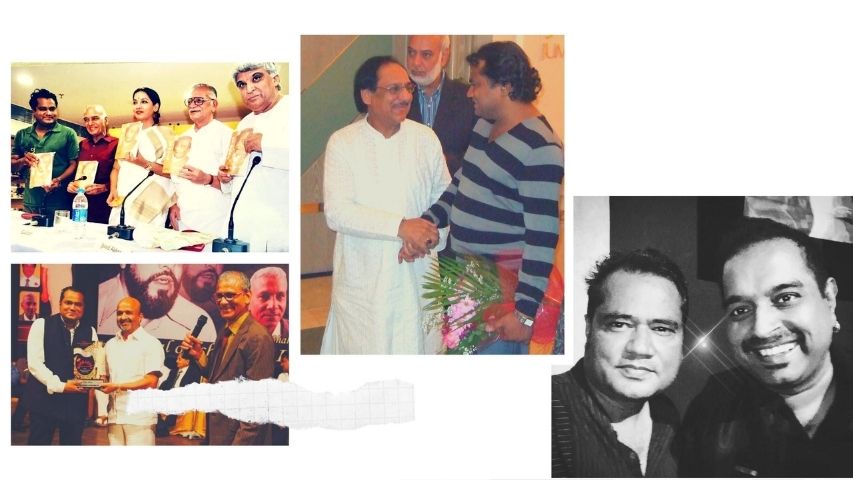
You wrote songs for the album Aapke Dil Mein (2006) - Singers Asha Bhosle-Sanjay Dutt, Music Dir-Shamir Tandon). Then for the album Mehbooba Dilruba (2006) Singer Asha Bhosle, Music Director Shamir Tandon. These were private albums. Again how was it working with Ashaji?
My first meeting with Ashaji was as a journalist. In the course of the interview itself she had gauged two of my abilities: that I am a good writer in Hindi and that I can write poetry. A friendship followed. It was in 2006 that I got a call from Ashaji and Shamir Tandon to work on a song. I wrote the song Dilruba picturized on Urmila Matondkar. Ashaji had sung that as duet with Sanjay Dutt. Ashaji told me ‘Your song ‘Ek pal ka jeena’ appealed to me so much that I would often land up at Metro theatre during interval because I knew just after interval this song comes. I would watch the song and leave.’
In the present a film is due for release - An idiot and a beautiful liar. In that Ashaji has sung a mujra written by me. The experience of working with Ashaji is akin to a dream come true. Lataji, Ashaji are invaluable. Those who would be close to Lataji would distance themselves from Ashaji. Those close to Ashaji would keep a distance from Lataji. I often visited Ashaji for interviews and song sittings. After my marriage we went over to Ashaji’s place for her blessings. She gifted my wife Shehnaz a beautiful saari.
Vijay Akela also wrote a song in the 2010 released film, Do Dilon Ke Khel Mein. The song ‘Resham ka dupatta phar diya’ was sung by Rekha Bhardwaj. In ‘My Friend Ganesha’ (2010), he wrote songs. In Daal Mein Kuch Kaala Hai (2012) he wrote songs. The silsila of a film song here and there continued.
I feel that you did not write as many film songs or private songs as you could have. Any specific reason?
If truth be told this is a question I don’t have an answer for. Why despite such big success in film songs I did not get to write many more?! I had reached my destination with the success of my first film song itself. I considered myself a responsible song writer. I read lots of poetry in Hindi, Urdu, English. I wrote books on poets: Anand Bakshi, Jan Nisar Akhtar, Majrooh Sultanpuri, on the 25 years spent with Javed Akhtar Saheb, my own collection of poetry. I also wrote a film script on Sahir Ludhianvi. I started to enjoy myself in the mushairas.
I had also worked with Khayyam Saheb. That was a very big achievement for me. That album Zehenaseeb was brought out by Big Music.
In your radio talk-show many noted personalities have featured: Asha Bhosle, Anandji, Javed Akhtar, Shabana Azmi, Bindu, Jatin-Lalit, Shravan Rathod, Rakesh Anand Bakshi. Share with us your take-away from the talks. It is a very significant exchange programme. Archival.
All India Radio gave me the opportunity. They knew that I would conduct programs with grace and respect. AIR gave me the freedom to choose the songs to be played in the program. We would play a song after every clip of talk. You will be shocked to learn that we conducted a six hour long interview with Asha Bhosle. It played over 8-10 episodes. Salim Khan Saheb complimented me on my interview with him. My weakness is radio. I like to talk on it. In Dubai during my radio stint they would cut the overture music of a song or the end music. I did not like that. Here I got complete creative freedom. And it was not a time bound job.
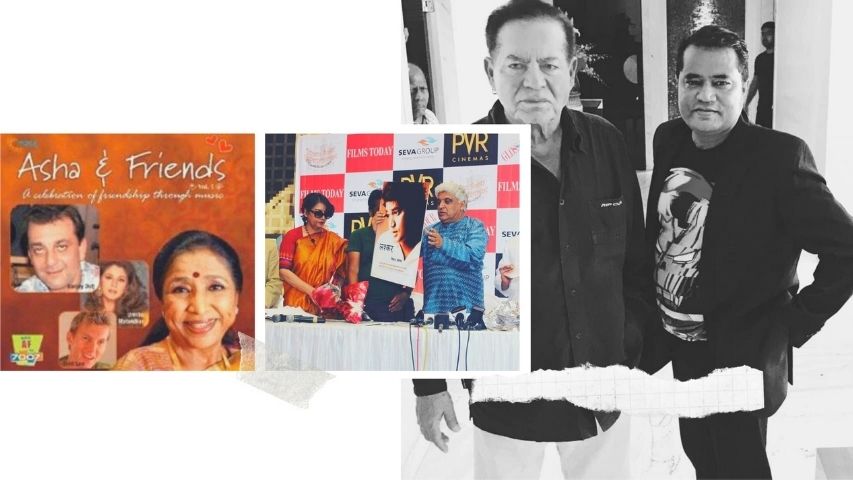
Lashkar is your collection of literary poems. Tell us about it.
With Lashkar I too got counted among poets. Many respected persons spoke about it. Javed Akhtar Saheb , Nida Fazli Saheb, Hasan Kamaal Saheb, Shaukat Kaifi Azmi. The response was very good. I got good royalty. Lashkar had good sales in Bangladesh, Pakistan. Though I write in Urdu, the script is Devanagari. Lashkari zubaan ko hi Urdu zubaan kehte hain. Because of Lashkar’s good sales they increased the price of the book. I wrote on Facebook, ‘Bangladesh, Pakistan stop buying my poetry. My own citizens in India too have to buy the book’. Amazon on discount was selling it for Rs 4500. Then I gave it to another publication house and that is how the price got regulated and people started buying. My next book of poems is being published by Rajkamal Publications. It is named Jihaad.
Main Shayar Badnaam is a compilation of songs written by Anand Bakshi. It is a very good effort. Anand Bakshi Saheb was an out of the ordinary lyricist who had an outstanding understanding of the grammar and vocabulary of film songs. Do throw further light.
It was as a journalist I had met Anand Bakshi Saheb. I really befriended him. I was in love with his songs. I had noticed that he would take a walk in Jogger’s Park every evening. I caught him there. We got talking. When I asked him, who in his family shares credit for his grand success, he started crying. I went on to ask him about his association with Rajesh Khanna, Dharmendra, Jeetendra, for whom he had written such great songs. He kept quiet. In that silence he indicated to me that I too had written hit songs for Hrithik Roshan, how is my relationship with him?
The craft of literary poetry and film lyrics may have something in common, yet are very different. How do you distinguish between the two?
Literary poetry gives you a lot of freedom. You have a vast, clear sky in front of you. You can write on any subject. But in film-song writing there is an inherent limitation. The situation in a film song offers you a greater challenge than a literary one. Films have all types of situations: romantic, tragic - a song on Auntyji going to a party. As lyricists we have to put an element of sweetness even if the situation is painful. “Ye duniya agar mil bhi jaaye toh kya hai” that Sahir wrote, has two aspects to it. The song is about pain, but the singing, despite the tragedy, is rendered so beautifully that you end up nourishing and preserving that element of pain. You own that pain.
You book Nigahon Ke Saaye is on the works of poet-lyricist Jan Nisar Akhtar. Then there is a book titled Javed Akhtar Aur Main. Do inform us about them.
Jan Nisar Akhtar Saheb’s book was published by Rajkamal. I edited that book. I had to do it. He was a fantastic poet. What a flow he has! There is a neatness in the craft of his songs. This poet has read a lot. When I gave the proposal to Rajkamal they immediately agreed. I got paid in advance. Lataji considers his penned song ‘Aye dil-e nadaan aarzu kya hai…’ (film Razia Sultan) as one of her best songs.
When I look back I wonder what exactly have I done in life except to get impressed by Javed Akhtar Saheb. I routinely visit his mehfils, meetings. He shares wonderful talks, issues, anecdotes. He fought for the release of Anand Bakshi Saheb’s book. This is the only book prefaced by Salim Khan Saheb. It figures in Amazon best sellers list. I am getting royalty. They are asking me to translate into English.
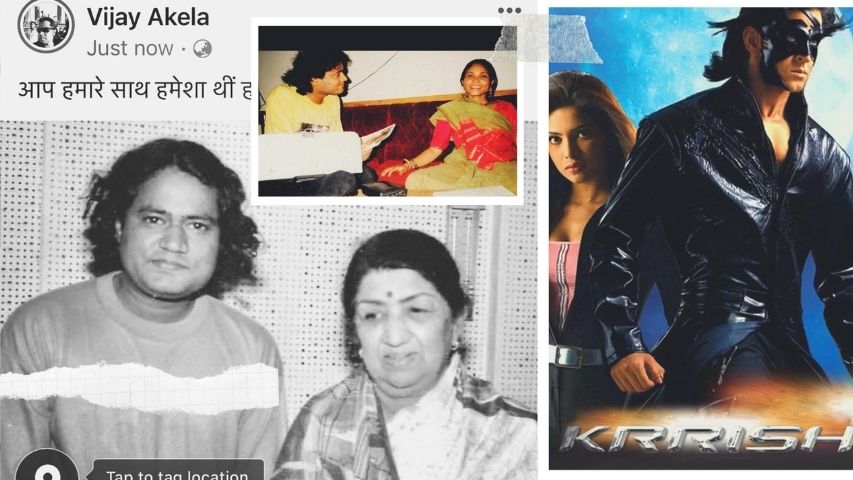
A very important book is your compilation of Majrooh Sultanpuri work and his shakhsiyat in a book titled Rahe Na Rahe Hum Mehka Karenge. It had a grand release in Oct 2021 in the presence of Javed Akhtar, Shabana Azmi, Lalit Pandit, Shailendra Singh. Tell us about it.
Rajkamal took 15 years to publish it. But the release function did all the justice too. The way Javed Saheb spoke on Majrooh Saheb, it brightened up the mehfil. The function was memorable. That occasion and function told me that I am moving in the right direction. Songs ought to get recognized by a lyricist’s name too. He too has a right on the song. This does not happen. A song invariably gets noticed and publicized in the name of a singer or the music director. It is a fight for me. Why do we not know who is the lyricist of the song ‘Piya basanti re kahe sataye…’? Why don’t we recall who wrote ‘Kabhi toh nazar milao …’? People ask for a Ghulam Ali ghazal to be rendered. Ghulam Ali’s father has not written his songs. It is not a Jagjit Singh ghazal. It is sung by Jagjit Singh.
Contemporary Hindi film songs are gasping for breath, fighting to survive. The creative in it is very average if not sub-standard. Have our films lost the beauty of their vocabulary, given up its importance?
You have made a very pertinent point. Only a lover of music can state it in this way. Where are songs being created in today’s times? Old songs are twisted and turned, a line added here and there. Yes, at times one comes across some amazing lyrics. That is heartening. If truth be told the music directors and singers of today have made singing very difficult. It is difficult to sing or hum them. Let’s wait and watch for the hopeful return of those melodious times that we were once amid. Even otherwise, something new but worthwhile should happen. The first agenda on the list of a musician today is a foreign tour. Now look today even Javed Saheb is not getting work. That is because he got the copyright amendment bill passed. But Amitabh Bhattacharya is writing good songs.
What are the assignments presently occupying you? A work in progress?
Lined up is the Hindi version of NT Rama Rao film Mahanayak 2. I have written all the songs in it. MM Kreem is the music director. The music is magnificent. I have tried to write well. Reputed singers have sung the songs. Then there is a film, An Idiot And A Beautiful Liar. All the songs are written by me. There is a mujra song rendered by Ashaji. That is the specialty. On music portals like Sawan, Mauj, Amazon my songs have been coming regularly.
I am also writing for the new Krrish. My upcoming book Jihaad is a collection of poetry. Then a film screenplay that I have written on Sahir Ludhianvi is titled Ye Duniya Agar Mil Bhi Jaaye Toh Kya Hai. I want to direct the film. Actors want a letter from the studio backing the film and studios ask for letters from actors. I will now make it from my own money. It is revisiting Sahir Ludhianvi.
Here is wishing best wishes to the passion in Vijay Akela’s voice and pen.




-173X130.jpg)
-173X130.jpg)
-173X130.jpg)


-173X130.jpg)
-173X130.jpg)
-173X130.jpg)